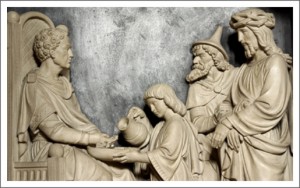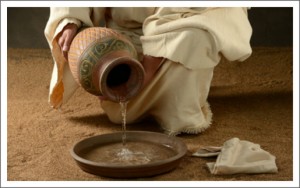A Tale of Two Basins by Tony Cooke
A Tale of Two Basins
Tony Cooke
There are two stories in the New Testament that occurred within twenty-four hours of each other, and they create an amazing contrast of two individuals, two life-styles, two attitudes, and two perspectives. About the only common denominator between these two stories is that they each involve a basin of water.
These two stories serve as models or examples of choices everyone must make, and the decisions we make will dictate the course of our lives. In reality, everyone is living out of and according to the principles of one of these two basins.
Pilate’s Basin of Water: Abandoned Responsibility
 The story of Pontius Pilate is most fascinating. As the Roman Governor of Judea, he found himself thrust into a situation he could have never imagined. The religious elite of his country came to him, vehemently demanding the crucifixion of one they claimed to be a horrible criminal.
The story of Pontius Pilate is most fascinating. As the Roman Governor of Judea, he found himself thrust into a situation he could have never imagined. The religious elite of his country came to him, vehemently demanding the crucifixion of one they claimed to be a horrible criminal.
Two statements reveal Pilate’s perspective of the matter.
Matthew 27:18 (NLT) tells us that, “He (Pilate) knew very well that the religious leaders had arrested Jesus out of envy.”
Pilate declared, “I find no fault in Him at all” (John 18:38). Actually, in John’s Gospel, Pilate made this same statement three times to the religious leaders.
So what did Pilate do when he succumbed to political pressure and commissioned the execution of a man he knew to be innocent?
Matthew 27:24 (NLT)
24 Pilate saw that he wasn’t getting anywhere and that a riot was developing.So he sent for a bowl of water and washed his hands before the crowd, saying, “I am innocent of this man’s blood. The responsibility is yours!”
To Pilate, the basin of water that he called for, and in which he washed his hands, represents abandoned responsibility. Pilate did what was convenient and politically expedient for himself instead of operating as a man of principle and ethics. He followed the path of fallen humanity and declared himself innocent. But we need to keep in mind the truth that Paul articulated: “For not he who commends himself is approved, but whom the Lord commends” (2 Corinthians 10:18, NKJV).
Pilate certainly was not the first figure in human history who attempted to wash his hands in the basin of abandoned responsibility. Consider some of the others…
Instead of giving God a straightforward answer when asked if he’d eaten the forbidden fruit, Adam threw in some blame-shifting. “It was the woman you gave me who gave me the fruit, and I ate it” (Genesis 3:12, NLT).
Having murdered his brother, Cain was asked by God about the whereabouts of Abel. Cain responded, “I do not know. Am I my brother’s keeper?” (Genesis 4:9, NKJV). Once again, we see abandoned responsibility.
Aaron tried to abandon responsibility after he had sculpted the golden calf. His almost hilarious response when confronted by Moses was, “‘Don’t get so upset, my lord,’ Aaron replied. ‘You yourself know how evil these people are. They said to me, ‘Make us gods who will lead us… So I told them, ‘Whoever has gold jewelry, take it off.’ When they brought it to me, I simply threw it into the fire—and out came this calf!’”
Moses himself had tried to wash his hands in the basin of abandoned responsibility when he tried to dodge the call of God by saying he was not eloquent and that he was slow of speech. Likewise, Gideon tried playing the “inferiority” card, and Sarah and Jeremiah tried copping out because of age issues. Sarah said she was too old and Jeremiah said he was too young. Though they all tried to evade responsibility, God did not accept their excuses and insisted that they embrace their assignments.
Jesus discussed the issue of people abandoning responsibility in the context of people who were invited to a great banquet. Instead of responding positively,“…they all began making excuses. One said, ‘I have just bought a field and must inspect it. Please excuse me.’ Another said, ‘I have just bought five pairs of oxen, and I want to try them out. Please excuse me.’ Another said, ‘I now have a wife, so I can’t come’” (Luke 14:18-20, NLT). The verses that follow reveal the host’s anger at the excuses, and his determination for people to experience his generosity. He told his servant, “Go out into the country lanes and behind the hedges and urge anyone you find to come, so that the house will be full. For none of those I first invited will get even the smallest taste of my banquet.” (Luke 14:23-24, NLT).
What is the lesson? God is yearning for us to respond to Him positively; to willingly and wholeheartedly accept His truth, His admonitions, and His challenges for our lives. If we follow Pilate’s example by washing our hands in the basin of abandoned responsibility and declaring ourselves innocent, we are deceiving ourselves and are missing out on God’s blessings.
Jesus’ Basin of Water: Embraced Responsibility
 Shortly before Pilate called for a basin, Jesus had taken another basin and used it for a far more godly purpose. We read about this in John’s account of the Last Supper.
Shortly before Pilate called for a basin, Jesus had taken another basin and used it for a far more godly purpose. We read about this in John’s account of the Last Supper.
John 13:3-5 (NLT)
3 Jesus knew that the Father had given him authority over everything and that he had come from God and would return to God. 4 So he got up from the table, took off his robe, wrapped a towel around his waist, 5 and poured water into a basin. Then he began to wash the disciples’ feet, drying them with the towel he had around him.
Because of Jesus’ attitude and actions, because of His humility and obedience, this event speaks of a basin of embraced responsibility. Jesus’ act of servitude—washing the feet of His disciples—seems counterintuitive and contradictory to what Jesus knew. Review verse three again.
- Jesus knew that the Father had given Him authority over everything.
- Jesus knew that He had come from God.
- Jesus knew that He would be returning to God.
With Jesus’ awareness of who He was, it seems like He would have called for a basin and had others wash His feet, but that’s not how embraced responsibility works. Kingdom responsibility is not about getting others to serve us, but about us serving others. I know that the phrase in verse four (He took off His robe) is a literal statement, but it reminds me of what Philippians 2:5-8 (TLB) says of Him.
“Your attitude should be the kind that was shown us by Christ Jesus, who, though He was God, did not demand and cling to His rights as God, but laid aside His mighty power and glory, taking the disguise of a slave and becoming like men. And he humbled Himself even further, going so far as actually to die a criminal’s death on a cross. Yet it was because of this that God raised Him up to the heights of heaven and gave Him a name which is above every other name, that at the name of Jesus every knee shall bow in heaven and on earth and under the earth, and every tongue shall confess that Jesus Christ is Lord, to the glory of God the Father.”
Not only did Paul say we should have the same attitude that Jesus had, but the Lord Himself, when He washed the feet of the disciples, said, “…since I, your Lord and Teacher, have washed your feet, you ought to wash each other’s feet. I have given you an example to follow. Do as I have done to you” (John 13:14-15, NLT).
Pilate evaded responsibility, and were it not for his brief encounter with Jesus, he would be nothing but a footnote in a few, obscure historical books. Jesus embraced responsibility, and He is honored and worshipped by millions around the globe.
Winston Churchill said, “The price of greatness is responsibility.” If we want to be great in the Kingdom, we must embrace our responsibility of servanthood as Jesus did. This means no more excuses, no more cop-outs, no more blameshifting, no more ignoring or neglecting the mandates of heaven. Consider the following statements:
R.T. Kendall said, “When the Spirit is absent, our excuses always seem right, but in the presence of the Spirit our excuses fade away.”
Benjamin Franklin observed, “I never knew a man who was good at making excuses who was good at making anything else.”
D.L. Moody stated, “Excuses are the cradle… that Satan rocks men off to sleep in.”
Remember this. There are two basins, and each of us has a choice. Abandoning responsibility is easier at the beginning, but is fruitless in the end. Embracing responsibility is more difficult at the beginning, but is glorious in the end.


